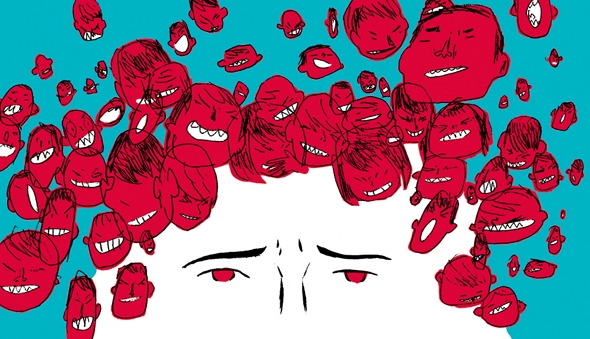

In the world of social media, Twitter’s hard times have caused much hand wringing and head scratching. Once hailed as a global marketplace for the exchange of ideas, a modern Areopagus of sorts, the social network has seen its growth achieving ever flattening levels of stagnation. And as resident social media watchman, I’m beginning to see some of these patterns affect the Mockingbird twitterverse as well.
So when we received this essay in the email about Twitter’s struggles and realistic anthropology (ht. GP), the light bulbs clicked on. Umair Haque gives a thoughtful, if somewhat emotional, critique about the nature of “abuse” in tweet-land:
Here’s my tiny theory, in a word. Abuse. And further, I’m going to suggest in this short essay that abuse — not making money — is the great problem tech and media have. The problem of abuse is the greatest challenge the web faces today. It is greater than censorship, regulation, or (ugh) monetization. It is a problem of staggering magnitude and epic scale, and worse still, it is expensive: it is a problem that can’t be fixed with the cheap, simple fixes beloved by tech: patching up code, pushing out updates.
To explain, let me be clear what I mean by abuse. I don’t just mean the obvious: violent threats. I also mean the endless bickering, the predictable snark, the general atmosphere of little violences that permeate the social web…and the fact that the average person can’t do anything about it.
Haque goes on to describe what we’ve all seen: #CecilTheLion and #BoycottStarWarsVII, the mob justice dealt out to Lindsey Stone, the very real culture of misogyny that many women face. But more than that, his observation regarding the “general atmosphere of little violences” is helpful- as if our 140 characters became electronic tools of passive-aggression. While you and I have likely avoided the wrath of the twitter mob, all users in social media have experienced that helpless frustration that comes from online aggression. Much to his credit, though, Haque doesn’t stay with a victim-only paradigm. He continues:
Abuse does not arise in a vacuum. A healthy mind does not (need to) abuse. Abuse is created of trauma, and it is the traumatized mind which abuses. Whether to externalize, bury, escape its anger and frustration — the abused mind must purge it’s hurt in some manner, or risk being broken, split apart by it entirely….
But we are also, in our anger and despair, its enforcers. Endlessly, at least on the social web, picking on, bullying, squabbling with, decrying, outraged at, one another…for nothing that means anything at all. The abused become the abusers.
 There are no pure victims, says Haque–we are also victimizers in our own right. Thankfully, we know someone who can perform that purging action for us.
There are no pure victims, says Haque–we are also victimizers in our own right. Thankfully, we know someone who can perform that purging action for us.
Aside from you and me, Haque also points the finger at the designers of Twitter (and other social networks) for not creating a platform that takes our “abuse” nature (read: sin) into account. While we know that the law doesn’t have the power to change our abusing hearts, Haque suggests that better designed social network would build its “laws” with the expectation of abuse. Imagine a social network where the use of foul language would result in banishment from the service. Or an algorithm that refused to let you post passive-aggressively. Not sure how long I would be allowed to function on either network, even if we’re simply in first-use-of-the-law territory.
The whole article is worth a look if you’re into this world- particularly the part where he dubs MBAs and software engineers the “cardinals and archbishops” of social media. And his conclusion is helpful: “Can we create a better web? Sure. But I think we have to start with humility, gratitude, reality — not arrogance, privilege, blindness.” Online or offline, we could all use a little bit more of that humility, gratitude, reality. Those are actually a few of the gracious gifts that can heal and end abuse.

COMMENTS
2 responses to “The Areopagus and The Woodshed: Re-imagining Abuse in Social Media”
Leave a Reply













More than a timely post, my dear brilliant friend!
Wonderful stuff, B, just wonderful.